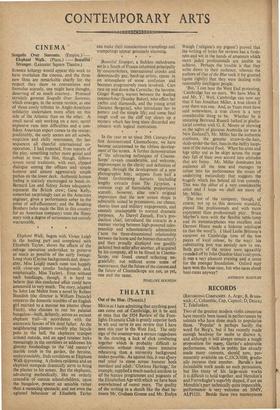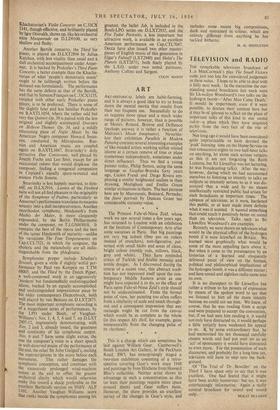RECORDS
(RECORDING COMPANIES: A, Argo; B, Bruns- wick; C, Columbia; Cap, Capitol; D, Decca T, Telefunken.
Two of the greatest modern violin concertos have recently been issued in performances by soloists who have done much to popularise them. 'Popular' is perhaps hardly the word for Berg's, but it has recently made enough headway for snobs to disown it, and although it will always remain a tough proposition for many, Gertler's admirable performance, which in public has already made many converts, should now, per- manently available on C.330(1030, gradu- ally increase their number. Bartok's less formidable work needs no such persuasion, but like many of his large-scale works it is difficult to hold together, and Menuhin's and Furtwangler's superbly shaped, if not on Menuhin's part technically quite impeccable, performance is very welcome on HMV. ALP1121. Beside these two masterpieces
Khachaturian's Violin Concerto on C.33CX 1141, though effective, and brilliantly played by Igor Oistrakh, shows up, like his orchestral suite Masquerade on D.LD9100, as very shallow and flashy.
Another liartok concerto, the Third for Piano, is played on D.LXT2894 by Julius Katchen, with less vitality than usual and a dull orchestral accompaniment under Anser- met. It is backed by Prokofiev's Third Piano Concerto, a better example than the Khacha- turian of what `people's democratic music' ought to be (although written before the demand was formulated). The performance has the same defects as that of the Bartok, and that by Samson Francois on C.33CX1135, coupled with other early Prokofiev piano pieces, is to be preferred. There is some of the slightly later and less familiar Prokofiev on B.AXTL1054, where the rather odd but very fine Quintet Op. 39 is paired with the less original and slightly sentimental Overture on Hebrew Themes Op. 34, and a mildly interesting piece of Night Music by the American Negro composer Howard Swan- son, conducted by Mitropoulos. Rus- sian and American music are coupled again on B.AXTL1047, Stravinsky's drily attractive Duo Concertant, well played by Joseph Fuchs and Leo Smit, except for an occasional rubato that would displease the composer, finding a congenial companion In Copland's equally spare-textured and austere Violin Sonata.
Stravinsky is less happily married, to him- self, on D.LX29I 6. Lovers of the Firebird suite will not all find pleasure in the originality of the Symphony of Psalms, particularly as Ansermet's performance translates its majestic serenity into a dull inexpressiveness. Another unorthodox symphony, Hindemith's from Mathis der Maier, is more eloquently expounded, by the Berlin Philharmonic under the composer, on T.LGM65018. It contains the best of the opera and the best of the tamer Hindemith of maturity—unlike his variations The Four Tenperaments on Cap.CCL7521, in which the sanguine, the choleric and the melancholic are all indis- tinguishable from the phlegmatic.
Symphonies proper include Sibelius's Seventh, given a virile if slightly-wilful per- formance by Paul van Kempen on T.TM 68005, and the Third by the Dutch Pijper, a well-composed work in an aggressively modern' but fundamentally undistinguished idiom, backed by an equally accomplished and undistinguished impressionist piece by his older contemporary Diepenbrock, both well played by van Beinum on D.LXT2873. The most important symphonic recording is of a magnificent series of performances, by the LPO under Boult, of Vaughan- Williams's ,Nos. 1, 4, 5, 6 and 7, on D.LXT 2907-121 iinpressively demonstrating, with Nos. 2 and 3, already issued, the greatness and continuity of his symphonic output. Nos. 6 and 7 have some slight extras, the One the composer's voice • in a short speech in well-deserved praise of the performance at the end, the other Sir John Gielgud's, reciting the superscriptions in the score before each movement. This rather damages the symphonic conception, and combines with the excessively prolonged wind-machine !Wises at the end to offset the greater orchestral clarity which would otherwise make this record a shade preferable to the excellent Barbirolli version on HMV. ALP 1102. Another Vaughan Williams score that ranks beside the symphonies among his
greatest, the ballet Job, is included in the, Boult-LPO series on D.LXT2937, and the Five Tudor Portraits, a less important but attractive work, is available in an excellent American performance on Cap.CTL7047. Decca have also issued two other master- pieces of English music of this generation in Elgar's Falstaff (LXT2940) and Hoist's The Planets (LXT2871), both finely played by the L.S.O. under two noted partisans, Anthony Collins and Sargent.
COLIN MASON



































 Previous page
Previous page